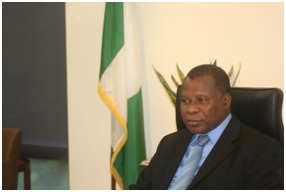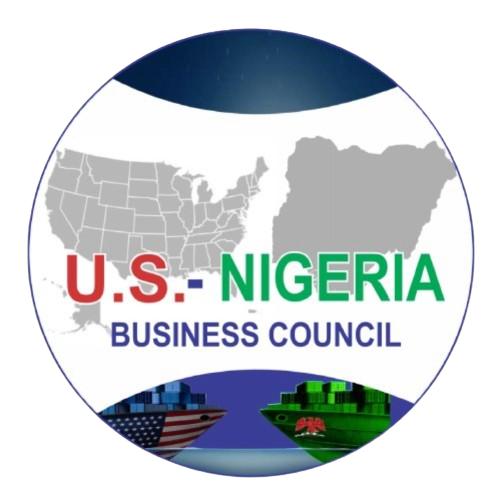Nigeria–United States Relations
Nigeria–United States relations are bilateral relations between the Federal Republic of Nigeria and the United States of America. Nigeria and the United States have long been close allies. An estimated one million Nigerians and Nigerian Americans live, study, and work in the United States, while over 25,000 Americans live and work in Nigeria.
The bilateral relationship has continued to improve, and cooperation on many important foreign policy goals, such as regional peacekeeping, has been excellent. The Nigerian government has lent strong diplomatic support to U.S. Government counter-terrorism efforts in the aftermath of the September 11, 2001 terrorist attacks.
 Nigeria is consistently a pro-America nation. According to the 2012 U.S. Global Leadership Report, 77% of Nigerians approve of U.S. leadership, with 9% disapproving and 14% uncertain, and according to a 2013 BBC World Service Poll, 59% of Nigerians view U.S. influence positively, with 29% expressing a negative view. Governing Justly and Democratically: The United States is helping Nigeria make exceptional efforts to develop inclusive, transparent, and effective institutions of democratic governance. U.S. assistance helps rebuild basic mechanisms of democratic governance to make elected officials accountable to constituents through free and fair elections, strong government institutions, and well-organized, informed citizens who demand performance
Nigeria is consistently a pro-America nation. According to the 2012 U.S. Global Leadership Report, 77% of Nigerians approve of U.S. leadership, with 9% disapproving and 14% uncertain, and according to a 2013 BBC World Service Poll, 59% of Nigerians view U.S. influence positively, with 29% expressing a negative view. Governing Justly and Democratically: The United States is helping Nigeria make exceptional efforts to develop inclusive, transparent, and effective institutions of democratic governance. U.S. assistance helps rebuild basic mechanisms of democratic governance to make elected officials accountable to constituents through free and fair elections, strong government institutions, and well-organized, informed citizens who demand performance
Bilateral Economic Relations
 The United States is the largest foreign investor in Nigeria, with U.S. foreign direct investment concentrated largely in the petroleum/mining and wholesale trade sectors. U.S. exports to Nigeria include wheat, vehicles, machinery, oil, and plastic. Nigeria is eligible for preferential trade benefits under the African Growth and Opportunity Act (AGOA). U.S. imports from Nigeria include cocoa, rubber, returns, antiques, and food waste. The United States and Nigeria have signed a bilateral trade and investment framework agreement. In January 2016, U.S. Secretary of Commerce Penny Pritzker visited Nigeria to kick-off a fact-finding mission with senior U.S. business executives who comprise President Obama’s Advisory Council on Doing Business in Africa. The Council’s visit underscored the broad U.S. commitment by both government and the private sector to advance economic engagement with Nigeria. The BNC meeting of March 30, 2016 noted the U.S. and Nigerian Governments’ pledge to work together to ensure maximum utilization of current programs to promote trade and investment, including AGOA and the bilateral trade and investment framework agreement.
The United States is the largest foreign investor in Nigeria, with U.S. foreign direct investment concentrated largely in the petroleum/mining and wholesale trade sectors. U.S. exports to Nigeria include wheat, vehicles, machinery, oil, and plastic. Nigeria is eligible for preferential trade benefits under the African Growth and Opportunity Act (AGOA). U.S. imports from Nigeria include cocoa, rubber, returns, antiques, and food waste. The United States and Nigeria have signed a bilateral trade and investment framework agreement. In January 2016, U.S. Secretary of Commerce Penny Pritzker visited Nigeria to kick-off a fact-finding mission with senior U.S. business executives who comprise President Obama’s Advisory Council on Doing Business in Africa. The Council’s visit underscored the broad U.S. commitment by both government and the private sector to advance economic engagement with Nigeria. The BNC meeting of March 30, 2016 noted the U.S. and Nigerian Governments’ pledge to work together to ensure maximum utilization of current programs to promote trade and investment, including AGOA and the bilateral trade and investment framework agreement.
Nigeria’s Membership in International Organizations
Nigeria and the United States belong to a number of the same international organizations, including the United Nations, International Monetary Fund, World Bank, and World Trade Organization. Nigeria also is an observer to the Organization of American States.
In July 2015, President Obama hosted President Muhammadu Buhari of Nigeria in the Oval Office to express U.S. commitment to strengthening and expanding our partnership with Nigeria’s new government (https://www.whitehouse.gov/blog/2015/07/21/president-obama-s-meeting-nigerian-president-muhammadu-buhari). “
Source: US Department of State, Bureau of African Affairs
